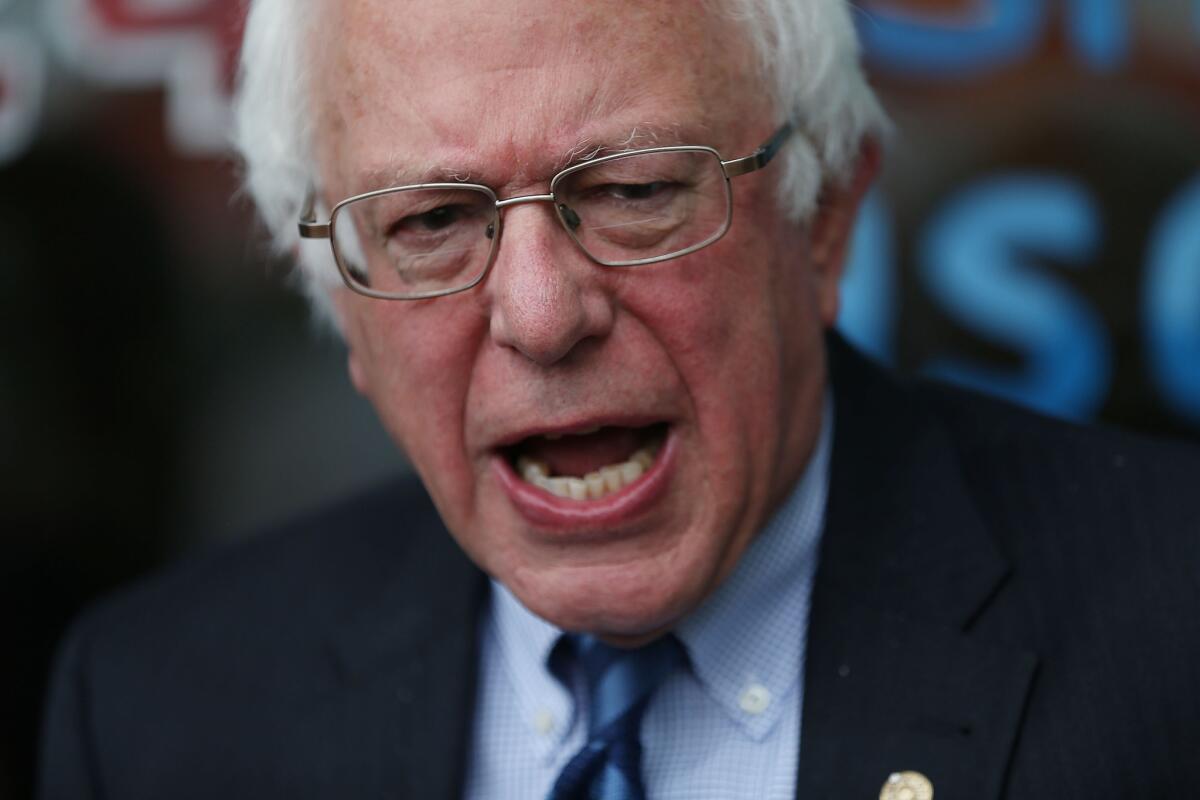Sanders wins Indiana, keeping his movement alive

Reporting from Indianapolis — Sen. Bernie Sanders remains on track to lose the Democratic nomination race, but he nonetheless managed to keep his agenda at the center of it with a victory in Indiana over the front-runner, Hillary Clinton.
The lone state that voted Tuesday was a test of the continued potency of Sanders’ fight as the Vermonter sought to maintain his political revolution as a force with which Clinton will need to wrestle.
The win in Indiana will help with that effort.
“I sense a great deal of momentum,” Sanders told reporters in Indiana after the results were in.
“We understand -- and I do not deny it for one second -- that we have an uphill battle in front of us,” he said. But there is a “path to victory, although it is a narrow path.”
Nonetheless, because the Democrats distribute delegates proportionately according to each candidate’s vote totals, the primary results will have little impact on the actual race.
The two candidates will split Indiana’s 83 pledged delegates roughly in half. That result benefits Clinton, who is closing in on a delegate majority.
Clinton’s campaign clearly signaled its lack of concern about the outcome here, spending no money at all on television advertising, in contrast with the roughly $1.5 million that Sanders spent.
Clinton has built a lead of roughly 300 pledged delegates over Sanders. Combined with the super-delegates who have vowed to support her at the party’s nominating convention in Philadelphia in July, the front-runner has already secured 90% of what she needs to lock up the nomination.
Sanders needs overwhelming victories in the remaining primaries to overtake the former secretary of State.
Those daunting odds, however, did not worry some Sanders voters as they lined up to cast ballots for him here.
Harry Pai, a 50-year-old in Noblesville, a suburb northeast of Indianapolis, works as a caregiver to his elderly parents. He said he voted for Sanders even though he doesn’t think the Vermont senator can win.
“I need to see more progressive views from Hillary Clinton,” he said.
Pai said Sanders should be in no hurry to exit the Democratic primary. “He’s OK to stay in the race, so long as he doesn’t get too antagonistic,” he said.
On the north side of Indianapolis, Kathy Dickerson said she, too, was not ready to give up on Sanders. The 59-year-old waitress has a younger child suffering from a chronic and costly illness and older children hamstrung by student debt. The healthcare system and free public colleges Sanders envisions are a big draw for her.
“Seeing a woman in office would be great,” she said. “But Bernie would represent the working class better than anybody else.”
However, Dickerson also said that at some point, the two candidates need to overcome their differences.
“I think it’s getting down to the wire, and they need to join forces,” she said of Sanders and Clinton. “I’m terrified of Donald Trump.”
The exit poll showed Sanders continuing to enjoy strong support from younger voters and also revealed that in Indiana, as in other states, the overwhelming majority of Democratic voters felt the spirited primary campaign had energized their party.
About half of those polled wanted a continuation of President Obama’s policies, while roughly a third wanted a more liberal agenda in the White House.
The demographics of the Indiana electorate, which is heavily white, were particularly favorable to Sanders, who does best in states with smaller minority populations. The rules in Indiana, a state where independents can vote in Democratic primaries, also helped the insurgent candidate.
Sanders also benefited from his arguments against U.S. trade agreements; the state’s workforce has been hit hard by the offshoring of manufacturing jobs.
Despite a string of setbacks in recent weeks, Sanders kept up the unrelenting pace here that has defined his run. He campaigned vigorously throughout the state, speaking at the kind of large rallies at college towns that initially sparked his movement and set in motion the fundraising machine that until recently had been outperforming Clinton’s.
He vowed to continue racking up delegates and to use them to push the Democratic Party in a more progressive direction, regardless of whether he is the nominee.
“We are going to create an economy that works for all of us, not just the 1%,” Sanders said at a campaign rally in Louisville, Ky., Tuesday night.
Clinton has largely ignored Sanders in the past week while turning her attention to Trump, the Republican front-runner. She was not even in Indiana on election day, nor was she there the day before.
Election 2016 | Live coverage on Trail Guide | Indiana primary election results | Track the delegate race | Sign up for the newsletter
“I’m really focused on moving into the general election,” Clinton said Tuesday on MSNBC, while campaigning in West Virginia. “I think that’s where we have to be, because we’re going to have a tough campaign against a candidate who will literally say or do anything. And we’re going to take him on at every turn on what’s really important to the people of our country.”
She also campaigned in Ohio, a state crucial to the general election, before returning to her home in Chappaqua, N.Y., for the night.
After crushing Sanders in New York last month and then scoring victories in four of the five Eastern states that voted the week after -- including Pennsylvania and Maryland -- the Clinton campaign declared the Democratic primary all but over and shifted its focus toward road-testing strategies for battling Trump.
Those included rolling out an official “Woman’s Card” in response to Trump’s remark that “the only thing she’s got going is the woman’s card” and that Clinton would not even garner 5% of the vote if she were male.
Clinton’s strategy has been to avoid getting drawn onto Trump’s turf of personal insults. Her campaign’s carefully crafted response was met with enthusiasm by donors. The “Woman Card” online fundraising effort was Clinton’s most successful yet.
Sanders, meanwhile, is looking to regain his footing and, at the very least, mount an aggressive fight at the party’s national convention to seek reforms in the primary system and to insert into the party platform his signature agenda of free public university tuition, government run healthcare for all and a $15 federal minimum wage.
In recent days, Sander’s fundraising, while still impressive, has plummeted. His campaign laid off more than 200 workers late last month. The senator has sought to boost morale of supporters -- and keep the donor dollars flowing -- by outlining an improbable road map for victory that would involve a contested national convention, something more commonly associated with this year’s chaotic GOP primary.
Even under such a scenario, which assumes a mass defection of superdelegates away from Clinton, the math would still work in Clinton’s favor. Sanders would need to beat Clinton in California and each of the other remaining states by some 30 points to overtake her lead in pledged delegates at this point.
Even as the two candidates continue jousting, fear of Trump is pulling many of their supporters together. Worry about the likely Republican nominee was partly what propelled Indianapolis mechanic Joel Dent to cast a ballot for Clinton on Tuesday.
Dent, 33, initially thought about voting for Sanders, but decided not to after he saw Trump employing a Sanders critique of Clinton that she was “unqualified.”
“He lost me when he started turning real ugly,” Dent said of Sanders. “He’s basically giving ammo to Donald Trump.”
Dent said he thinks it’s fine for Sanders to continue to campaign until the Democratic convention and try to influence the party platform, but only if he softens his critiques of Clinton and stops indicating that he has a path to victory in his fundraising emails, something Dent believes is dishonest.
“He needs to stop attacking Hillary and focus on the issues that are important for him. He cannot keep running in such a divisive manner,” Dent said.
“To me, it’s over, and I’m just ready to have everybody on the Democratic side come together.”
But his wife, Karhma, 41, disagreed. A stay-at-home mom, she cast her ballot for Sanders. While she said she would certainly support Clinton against a Republican in November, she said she wants Sanders to fight to the end.
“He’s like a real person,” she said. “I like everything he stands for.”
Halper reported from Washington and Linthicum reported from Indianapolis. Staff writer Melanie Mason in Noblesville, Ind., contributed to this report.
Follow me: @evanhalper
ALSO
Last chance? A desperate Ted Cruz looks to derail Donald Trump in Indiana
Bernie Sanders supporters strategizing to build a lasting progressive movement
Sorry, Trump, Cruz and Kasich: These high-profile Republicans are just not that into you
UPDATES:
7:02 p.m.: This story was updated with quotes from Sanders’ news conference.
6:26 p.m.: This story was updated with Sanders’ projected victory and other information.
More to Read
Get the L.A. Times Politics newsletter
Deeply reported insights into legislation, politics and policy from Sacramento, Washington and beyond. In your inbox three times per week.
You may occasionally receive promotional content from the Los Angeles Times.












